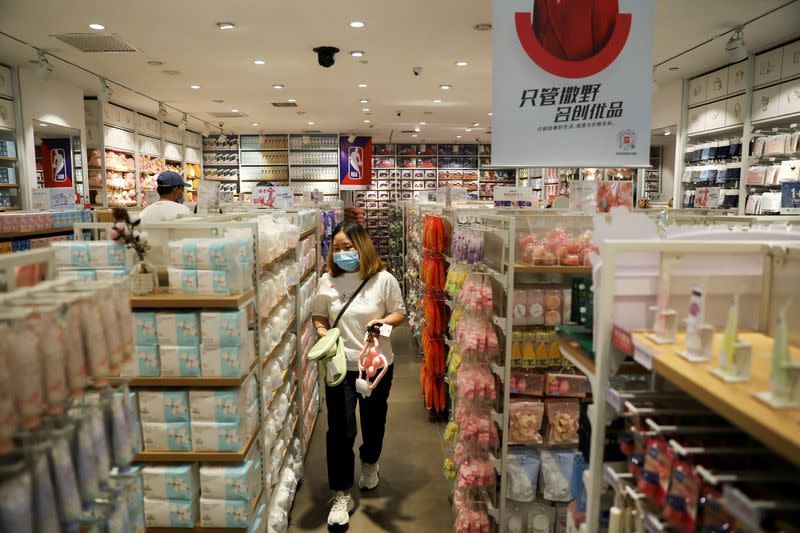Discount price wars by Chinese retailers are having a major impact on both company earnings and consumer thinking, analysts say.
Competition between low-cost retailers has exacerbated fears of deflation in the world’s second-largest economy.
From coffee to cars and clothes, China’s discount retailers have cut prices on just about everything as they chase a consumer whose confidence has been battered by a property crisis, high unemployment and a gloomy economic outlook.
ALSO SEE: China’s $41-Billion Buy-up of Unsold Homes Seen Falling Flat
While the retail downshift has propelled revenues for firms like discount e-commerce platform Pinduoduo against larger rivals such as Alibaba, economists fear their success is entrenching a Japanese-style deflationary mindset in the consumer that will be difficult to shake.
As retailers compete on price above all else, they force tough cost cuts onto their suppliers, squeezing profit margins. This in turn leads to lower wage growth or higher dependency on low-paid gig work, hurting household demand.
“If this situation continues, China may end up with what we call a vicious cycle: lower value-added consumption, deflation, low profit rates leading to low wages, which further pushes consumers to downgrade their consumption,” He-Ling Shi, an economics professor at Monash University in Melbourne, said.
In the most recent earnings season, revenues for low-cost firms beat market expectations and outpaced their competitors.
Revenues of PDD Holdings, which owns Pinduoduo, surged 131% while China’s leading food delivery app Meituan saw 25% growth. Discount retailer Miniso and Luckin Coffee reported growth of 26% for 42%, respectively.
PDD, Meituan, Miniso and Luckin Coffee did not immediately respond to requests for comment.
China’s consumer price data for May due on Wednesday is expected to show a slight uptick in inflation to 0.4% from 0.3% April.
However, analysts expect the headline figures will mostly be propped up by utility price hikes, masking more critical deflationary pressures.
Little consumer confidence
In an environment where consumer confidence is near rock bottom, price is king.
Car makers in China have been in a price war for almost two years due to tepid domestic demand. Over the past two months, some car dealers and auto financing firms have launched loan programmes with no down-payment and even zero interest.
Starbucks, which saw its China revenues decline 8% in the first quarter due to what CEO Laxman Narasimhan described as “fierce competition among value players” has in recent months increased its use of discount coupons to bring prices closer to Luckin Coffee.
CEO of food delivery giant Meituan, Wang Xing, said last week the firm had expanded coupon offerings and onboarded more delivery-only kitchens with lower overheads than dine-in restaurants. The app’s newer hotel booking business is pursuing what Wang called a “low star” strategy targeting cost-conscious domestic travellers.
Alibaba’s domestic e-commerce unit Taobao and Tmall Group and JD.com, which saw single-digit revenue growth, said in post-earnings calls that price competitiveness will be key to future growth.
Both companies have introduced longer sales periods for China’s mid-year shopping festival, known as “618”, with lowest-price guarantees for millions of products. In response, Pinduoduo has launched an “automated price-tracking system” to enable merchants to monitor and beat rivals.
An internal memo to staff sent by JD.com founder Richard Liu describing his firm as “bloated” has led to speculation the company will respond to the increased competition by cutting jobs – which is the opposite of what China needs for domestic demand to recover.
Longer-term, price wars may take out weaker players in various industries, allowing rivals to then lift prices and give their supply chains some respite, Albert Hu, a professor of economics at the China Europe International Business School in Shanghai, said.
He warned, however, that they would only be able to do so if growth in other industries creates enough jobs and income growth to compensate for any market exits triggered by price wars in consumer goods.
“Deflation is a serious issue, Japan has struggled with it for over three decades,” Hu said. “A critical factor is wage growth.”
- Reuters with additional editing by Jim Pollard
ALSO SEE:
China Exports Rise in May, But Doubts Remain as Imports Slow
China’s Property Debts Seen Weighing Down Economy for Years
US, EU Must Act Jointly on China’s Industrial Overcapacity: Yellen
Tesla to Axe 10% of Workforce as Dipping Sales, Price War Bite
Alibaba to Offload Grocery, Hypermarket Chains in E-Comm Push
Fears of China’s ‘Japanization’ Weigh On Asia Economic Outlook
























